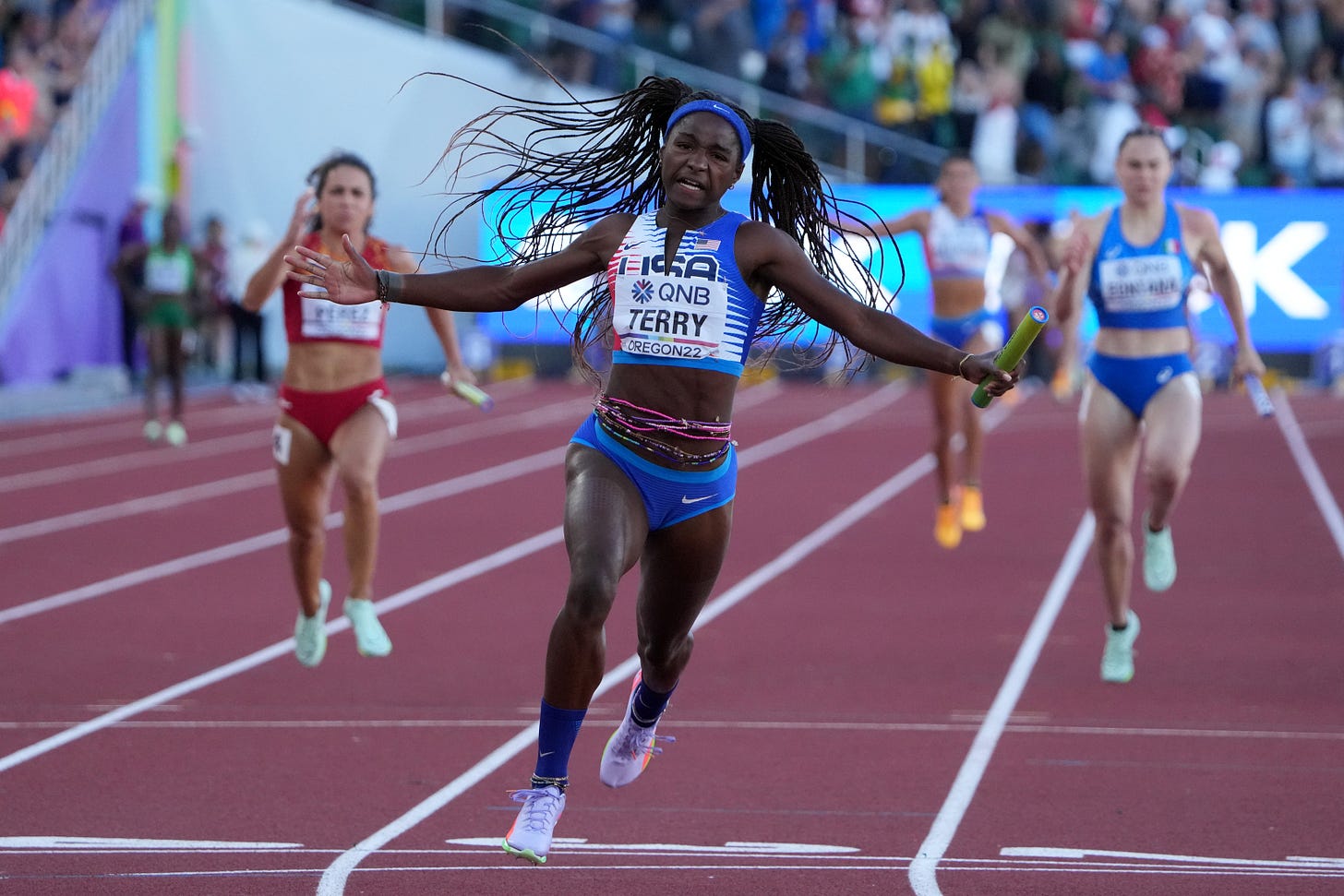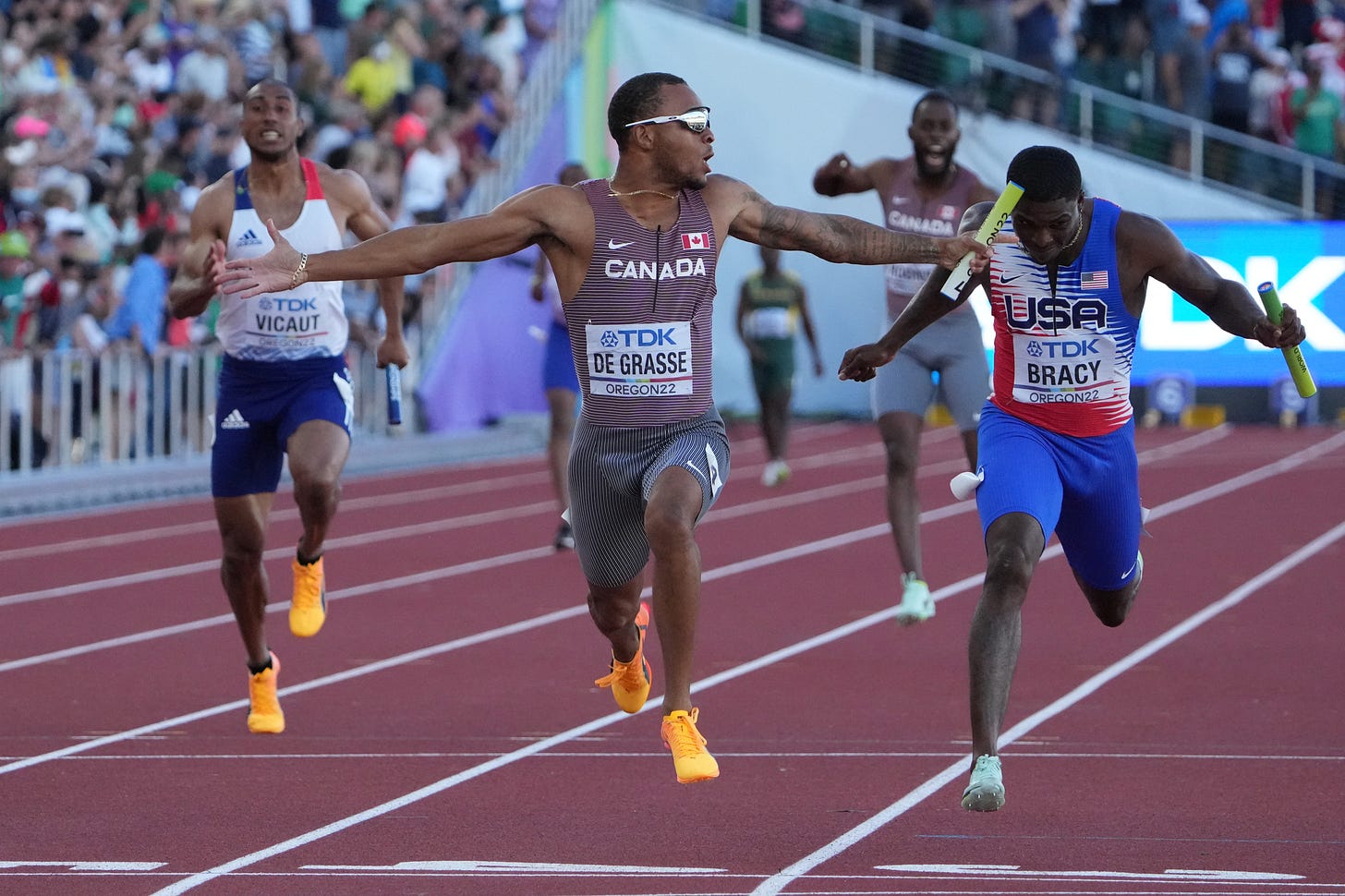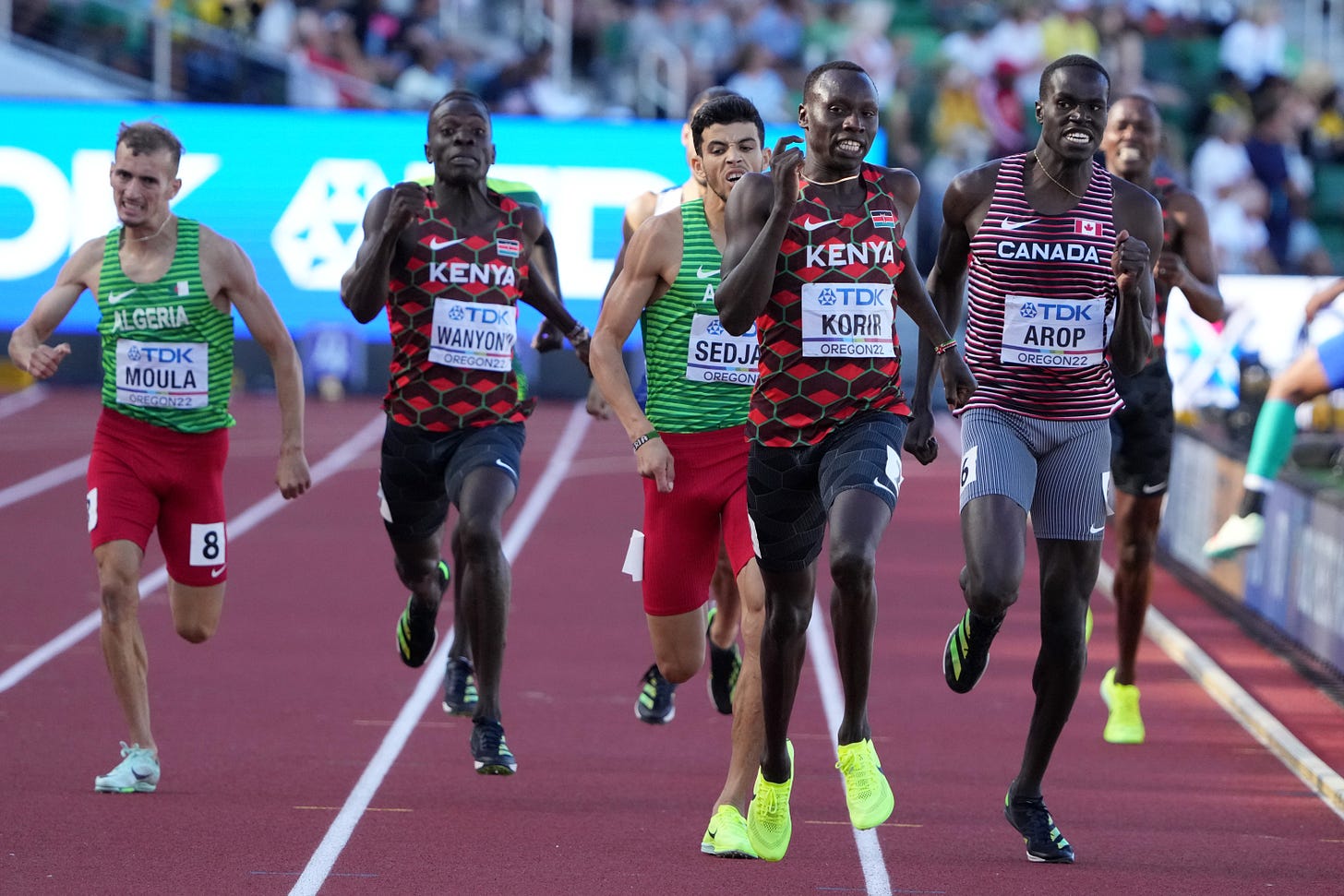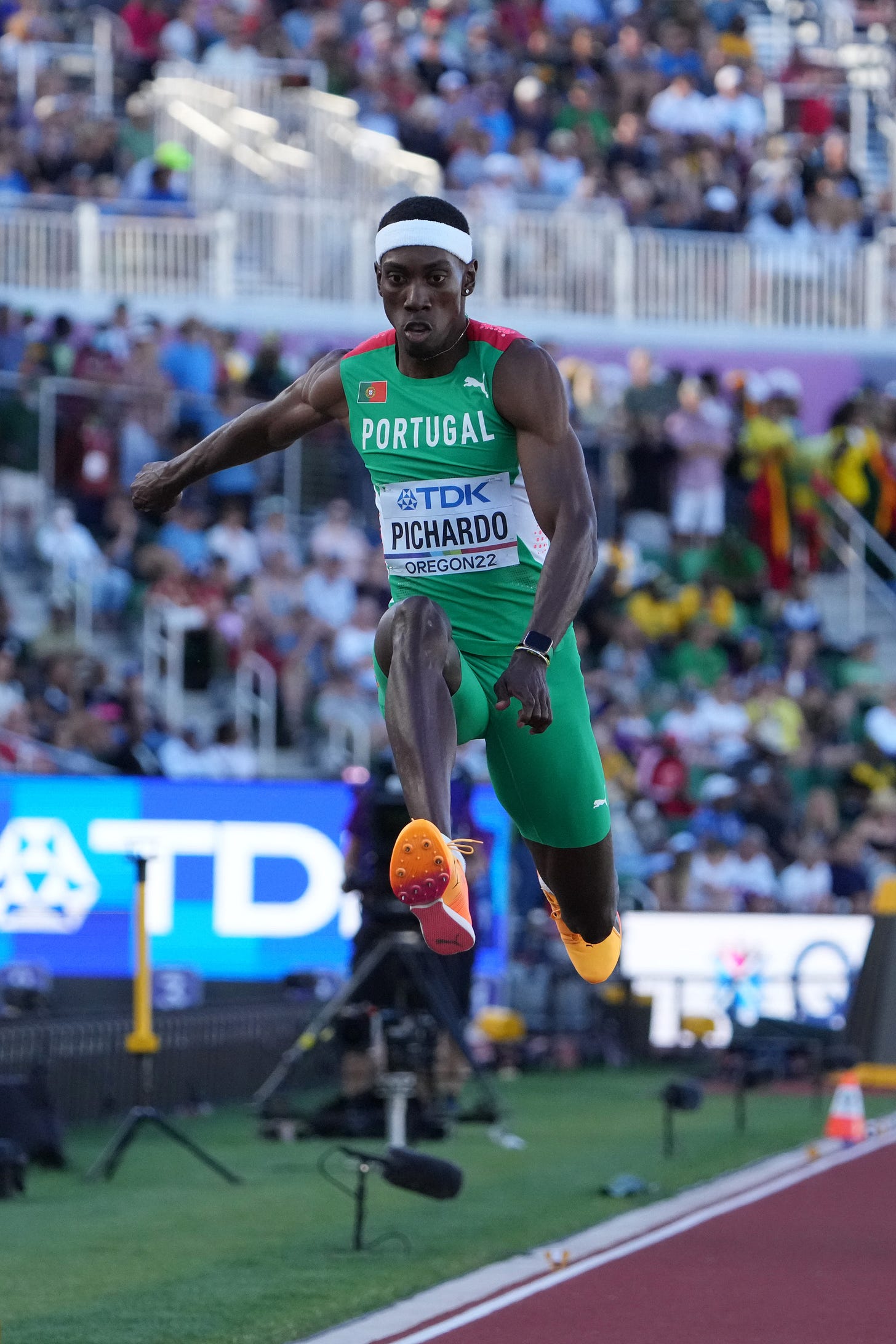Upset victories shock form charts
U.S. women and Canadian men score surprising World titles in 400-meter relays

EUGENE, Oregon – Nothing that happened during the first eight days of the World Athletics Championships at the University of Oregon’s Hayward Field indicated that the U.S. women would defeat Jamaica in the 400-meter relay on Saturday evening.
After all, Jamaica had swept the first three places in the women’s 100-meter dash on July 17 before going 1-2 in the 200 four days later.
In addition, the U.S. had failed to win a single individual sprint medal during the meet, and two of the four members comprising its 400 relay team had been unable to qualify for the final of their respective individual sprint event in the World Championships.
Yet Americans Melissa Jefferson, Abby Steiner, Jenna Prandini, and Twanisha Terry combined for a 41.14-second clocking in the 400 relay that helped them defeat a Jamaican quartet that included sprinters who rank second and third on the all-time world performer lists in the 100 and 200.
Jefferson, who placed eighth in the 100, had a very good first leg in which she outran Kemba Nelson of Jamaica.
The pass between Jefferson and Steiner was not great, but it was adequate, and Steiner, who had finished a disappointing fifth in the 200 on Thursday, held her own against Elaine Thompson-Herah of Jamaica down the backstretch.
The next 120 meters was key to the U.S. victory as Steiner and Prandini had a good pass between them and Prandini proceeded to run a dynamite third leg around the second turn that gave Terry a lead of about three meters over Jamaican Shericka Jackson, who had finished second in the 100 before winning the 200 in 21.45, the second fastest time in history.
Jackson made up a lot of ground on Terry, but she was unable to catch her by the finish line as Jamaica finished second in 41.18, followed by Germany in 42.03, Nigeria in an African record of 42.22, and Spain in a national record of 42.58.
The winning time of 41.14 by the U.S. was the fifth fastest ever run and the third fastest by a U.S. squad. The Jamaican team, that included five-time World 100 champion Shelly-Ann Fraser-Pryce on the third leg, moved to sixth on the all-time world list. It was the third fastest time ever by a Jamaican squad.
“It was not expected of us today,” Jefferson told World Athletics, “and I’m glad we pulled it through.”
Terry, who let out two huge shouts of “Yes” after crossing the finish line and coming to a stop two-thirds of the way around the turn, rightfully described the atmosphere at Hayward Field as electrifying.
“You heard the stadium,” she said. “The stadium went crazy. We just brought it home.”
The U.S. men, given their long history of mishaps in the 400 relay, were not as heavily favored to win their event as the Jamaican women. But they were definitely the team to beat, even though 100-meter champion Fred Kerley was not available for relay duty after sustaining a quadriceps injury during a semifinal of the 200.
A U.S quartet of Christian Coleman, 200 champion Noah Lyles, Elijah Hall, and 100 silver-medalist Marvin Bracy had run the fastest qualifying time of 37.87 on Friday, and the same squad lined up for the final that concluded the meet on Saturday.
With the crowd still buzzing over the U.S. victory in the women’s race, Coleman got the U.S. off to a good start on his leg, but he ran up on Lyles during their exchange, meaning the baton did not get through the passing zone as quickly as it could have.
Lyles ran well once he got going, but Canadian Jerome Blake kept pace with him at the next exchange.
Lyles and Hall had a solid pass and the U.S. appeared to have a small lead entering the final exchange zone, but the pass between Hall and Bracy was sloppy and ragged, and took too long, especially in comparison to the handoff between Canada’s Brendon Rodney and Andre De Grasse, who was off and running while Bracy was still in the process of securing the baton from Hall.
In theory, Bracy should have been able to catch De Grasse, who was eliminated in the semifinals of the 100 and pulled out of the 200. But when he was unable to do so, Canada won its first World title since 1997.
The Canadians’ winning time of 37.48 was a national record, tied them for 17th on the all-time world list, and gave them an all-important victory against a U.S. team that ran 37.55. Great Britain finished third in 37.83, followed by Jamaica in 38.06, and Ghana in a national record of 38.07.
De Grasse seemed particularly happy about the win as he has been slowed by various ailments – including a case of COVID-19 in June – this year after winning the 200 and placing third in the 100 in the Olympic Games in Tokyo last year.
“De Grasse simply does not give back any lead,” said NBC Sports commentator Ato Boldon during the network’s broadcast, “so he was able to get to the line first and pulls the upset.”

Upset was not a word associated with the performance of Anderson Peters of Grenada on Saturday as he dominated the men’s javelin in winning his second consecutive World title.
Peters, who was eliminated in the qualifying round of the Olympics, had the three best throws of the competition and four of the top five.
His first-round throw of 90.21 meters (295 feet 11 inches) gave him a lead he would never relinquish, and he improved upon that mark with efforts of 90.46 (296-9) in the second round and 90.54 (297-0) in the sixth.
Olympic champion Neeraj Chopra of India finished second with a best throw of 88.13 (289-1) and Jakub Vadlejch of the Czech Republic was third at 88.09 (289-0).
Gudaf Tsegay became the fourth Ethiopian to win a distance event in this year’s World Championships when she won the women’s 5,000 meters.
Tsegay, who finished second in the 1,500 on Monday, used a powerful kick at the end of a race that began with incredibly slow opening laps of 78 and 82 seconds. The next nine laps were run at a pace ranging from 68 to 72 seconds a lap before the real racing began with 600 meters left in the race.
The lead pack was down to seven runners at that point, and it had been reduced to six when Sifan Hassan of the Netherlands took the lead with 200 meters to go.
Hassan had used a withering kick to win the women’s 5,000 and 10,000 in the Olympics last year, but she has lacked the same level of fitness this year and was left behind in the home straightaway as Tsegay finished first in 14 minutes 46.29 seconds, followed by Beatrice Chebet of Kenya (14:46.75) and Dawit Seyaum of Ethiopia (14:47.36). Hassan placed sixth in 14:48.12.
Tsegay’s victory continued a superb meet for Ethiopia as the country has won 10 medals in distance events, including victories in the women’s 5,000 and 10,000, and in the men’s and women’s marathon.

Emmanuel Korir of Kenya displayed a powerful kick in winning the men’s 800 meters.
The Olympic champion had not had an impressive season heading into the World Championships as he had been beaten frequently and not run under 1:45 in the event.
He was content to run in fourth place for much of the final as Canadian Marco Arop led the field through the first lap in 52.03 and through 600 meters in 1:17.55.
Arop still had the lead entering the home straightaway, but Korir had moved into second place at that point and he sprinted past Arop with 70 meters left in the race.
He crossed the finish line in 1:43.71, followed by hard-charging Algerian Djamel Sedjati (1:44.14) and Arop (1:44.28).

Pedro Pichardo of Portugal was dominant in winning the men’s triple jump.
The Olympic champion produced his best mark in the first round when he bounded 17.95 (58-10¾), but he also had jumps of 17.92 (58-9½) in the second round and 17.57 (57-7¾) in the third round that would have been good enough to win the competition.
Olympic bronze medalist Hugues Fabrice Zago of Bukina Faso finished second at 17.55 (57-7) and silver medalist Yaming Zhu of China placed third at 17.31 (56-9½).
Although the victory gave Pichardo his first world title, he had placed second for his native Cuba in the World Championships in 2013 and ’15.

Ayden Owens-Delerme of Puerto Rico was the leader in the decathlon after the first five events with 4,606 points.
He was followed by Canadian Pierce LePage (4,485), Americans Zach Ziemek (4,469) and Kye Garland (4,413), Australian Ash Moloney (4,378), and Frenchman Kevin Mayer (4,372).
Owens-Delerme, who won the NCAA title for the University of Arkansas in June, was in fourth place in the standings after the first four events. But he vaulted into first after running a career best of 45.07 seconds in the 400, an event in which Olympic champion Damian Warner failed to finish after he pulled up with an apparent hamstring injury 130 meters into the race.
Garrett Scantling of the U.S., who had totaled a yearly world leading score of 8,867 points in May, had withdrawn his name from the U.S roster for the World Championships a couple of weeks ago and the U.S. Anti-Doping Agency announced on Thursday that he has agreed to begin serving a provisional suspension for a possible “Whereabouts and Tapering Anti-Doping Rule Violation.”
In results from Saturday morning, Olympic champion Jasmine Camacho-Quinn of Puerto Rico won her first-round heat of the women’s 100-meter hurdles in 12.52 and silver medalist Keni Harrison of the U.S. won her heat in 12.60.
Nigeria’s Tobi Amusan had the fastest qualifying time as her 12.40 clocking trimmed a hundredth of a second from the African record of 12.41 she set in Paris last month.
Defending World champion Nia Ali and fellow American Alaysha Johnson had disastrous results in the hurdles as each of them failed to finish their heats after hitting several hurdles.
Quanesha Burks of the U.S. had the top qualifying mark in the women’s long jump with a leap of 6.86 (22-6¼).
Olympic champion Malaika Mihambo of Germany qualified second at 6.84 (22-5¼) and bronze medalist Ese Brume of Nigeria was third at 6.82 (22-4½).
U.S. teams had the top qualifying times in the 1,600-meter relay heats that were run on Saturday afternoon.
The U.S. men ran 2:58.96 and the women clocked 3:23.38.



